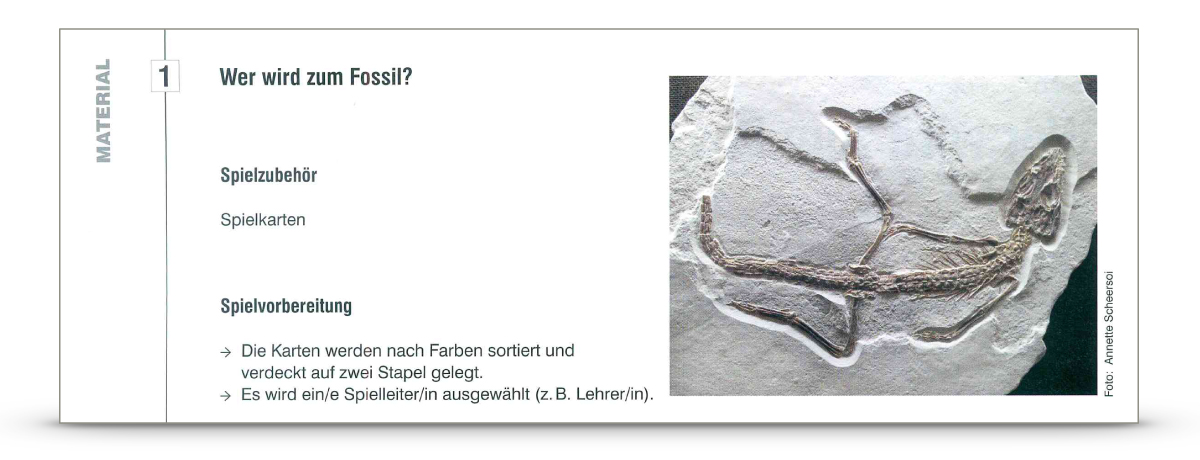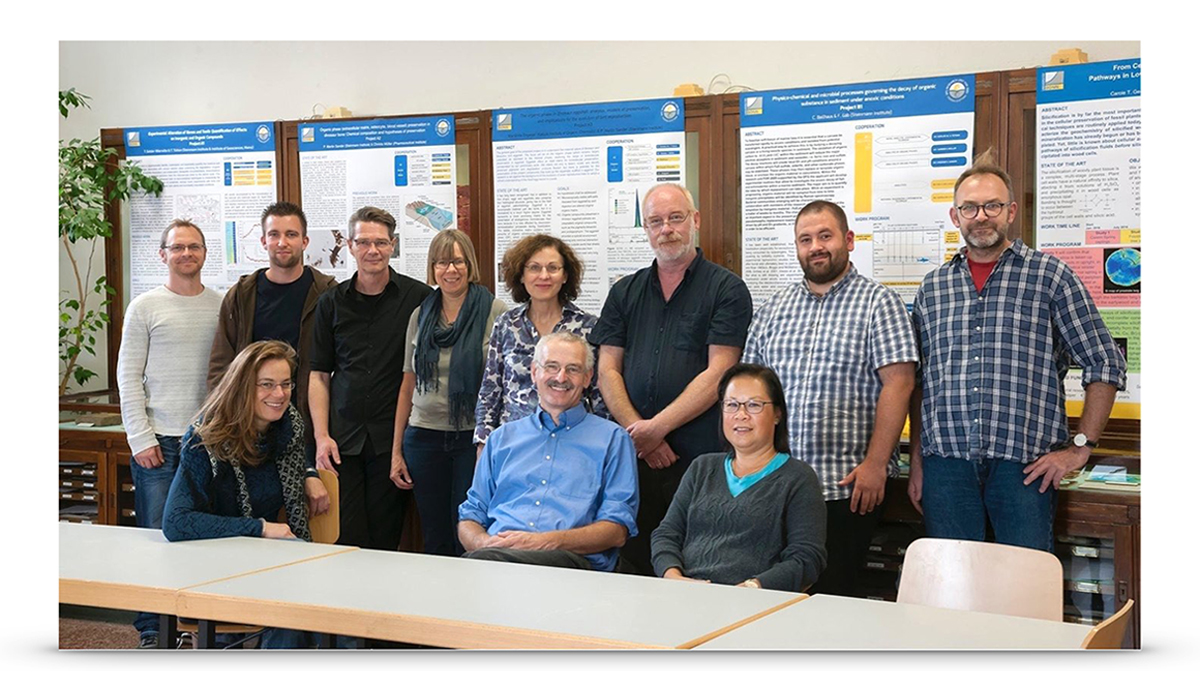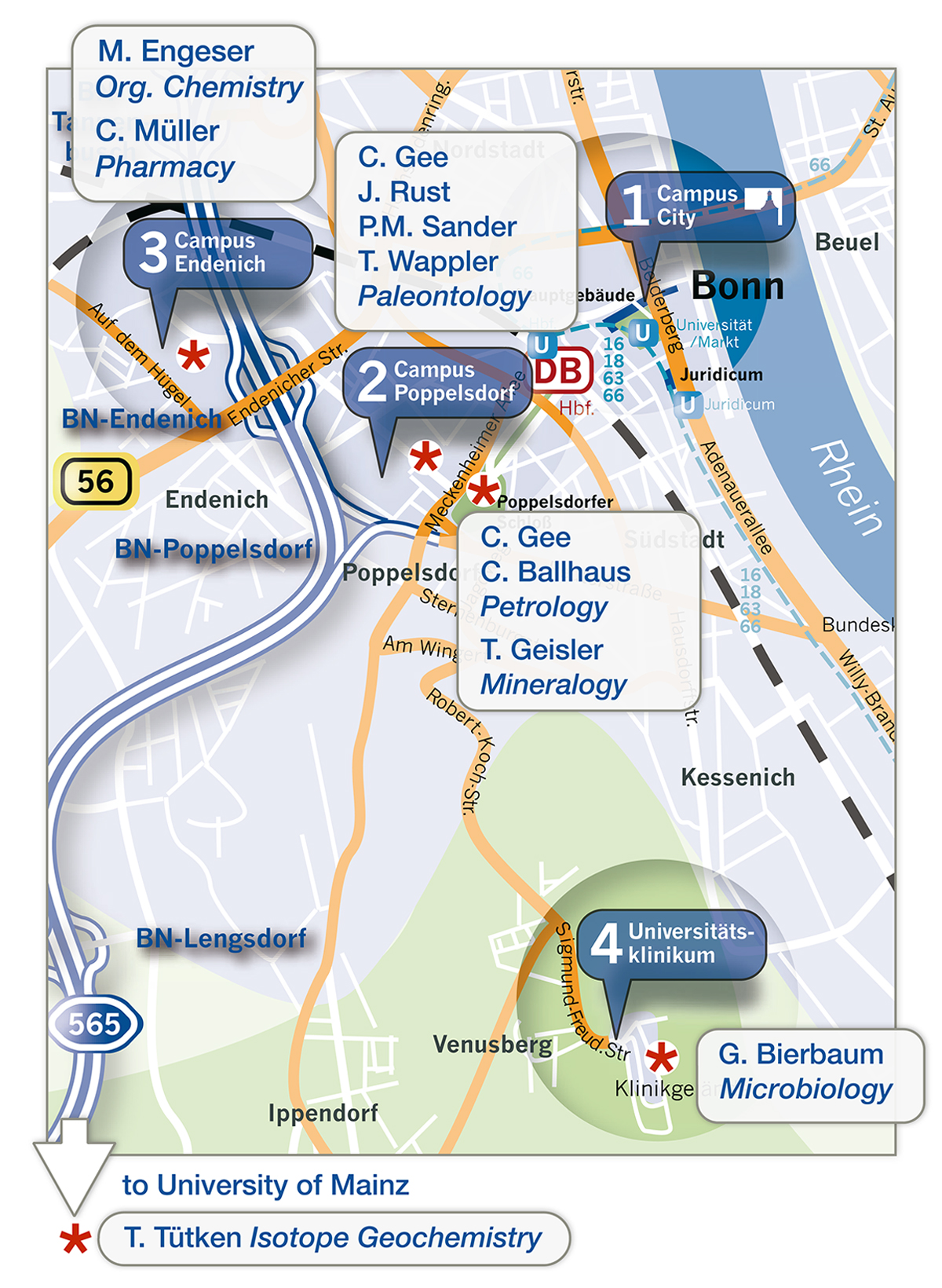DFG Research Unit FOR 2685
Composition and Location
The research unit will center around PIs at the Steinmann Institute of Geology, Mineralogy and Paleontology, the Pharmaceutical Institute, the Kekulé Institute of Organic Chemistry, and the Institute of Medical Microbiology at the University of Bonn to form a nationally unique cluster of expertise. The individual projects are linked by analytical expertise and the development of new analytical techniques that are shared among different projects.
| Project code |
Project title |
Principal investigators |
Researchers | Institute |
| Z | The Limits of the Fossil Record: Analytical and Experimental Approaches to Fossilization | Sander et al. | ||
| A1 | Experimental alteration of bones and teeth: Quantification of effects on inorganic and organic compounds | Prof. Dr. Thorsten Geisler-Wierwille | Anna Kral Dr. Frank Tomaschek |
Institut für Geowissenschaften / Mineralogie, Universität Bonn |
| Apl.-Prof. Dr. Thomas Tütken | Institut für Geowissenschaften / Paläontologie, Universität Mainz | |||
| A2 | Organic phase (extracellular matrix, osteocyte, blood vessel) preservation in dinosaur bone: Chemical composition and hypotheses | Prof. Dr. P. Martin Sander | Institut für Geowissenschaften / Paläontologie, Universität Bonn | |
| Prof. Dr. Christa E. Müller | Pharmazeutisches Institut / Pharmazeutische & Medizinische Chemie, Universität Bonn | |||
| A3 | The organic phase in dinosaur eggshell: Analysis, models of preservation, and implications for the evolution of bird reproduction | PD Dr. Marianne Engeser | Kekulé-Institut für Organische Chemie und Biochemie, Universität Bonn | |
| Prof. Dr. P. Martin Sander | Institut für Geowissenschaften / Paläontologie, Universität Bonn | |||
| B1 | Physicochemical and microbial processes governing the decay of organic substance in sediment under anoxic conditions | Prof. Dr. Christian Ballhaus | Dr. Fabian Gäb | Institut für Geowissenschaften / Petrologie, Universität Bonn |
| B2 | From cell to cell, tissue to tissue: Pathways in low-temperature wood silicification | PD Dr. Carole Gee | Dr. Moritz Liesegang Dr. Shook Ling Low |
Institut für Geowissenschaften / Paläontologie, Universität Bonn |
| Prof. Dr. Christian Ballhaus | Institut für Geowissenschaften / Petrologie, Universität Bonn | |||
| B3 | The impact of bacterial activity on decay and fossilization of arthropods: An experimental approach | Prof. Dr. Gabriele Bierbaum | M. Sc. Kathrin Janssen | Institut für Medizinische Mikrobiologie, Immunologie und Parasitologie, Universität Bonn |
| Prof. Dr. Jes Rust | Dipl.-Biologe Bastian Mähler | Institut für Geowissenschaften / Paläontologie, Universität Bonn | ||
| B4 | U-Pb systematics of fossilized biogenic tissues as a tracer of long-term diagenetic processes | Prof. Dr. Thorsten Geisler-Wierwille | Dr. Frank Tomaschek | Institut für Geowissenschaften / Mineralogie, Universität Bonn |
| C1 | The detection of antiherbivore secondary compounds in the fossil record and their potential role in defense against insects | PD Dr. Torsten Wappler | PhD Victoria McCoy | Institut für Geowissenschaften / Paläontologie, Universität Bonn Hessisches Landesmuseum Darmstadt |
| C2 | Soft tissue preservation in amber – a comparative study on the taphonomy and limits of fossilization of resin embedded arthropods | Prof. Dr. Jes Rust | PhD Jonas Barthel Dr. David Peris |
Institut für Geowissenschaften / Paläontologie, Universität Bonn |
Gender equality is a major concern in science administration and particularly in FOR 2685. Most basically, we plan to ensure gender equality by hiring an equal number of female and male Ph.D. students among the positions we hope to advertise. At the postdoctoral researcher level, we plan to recruit two female and two male scientists. There are several measures to persuade more women at the Ph.D. student level to pursue a scientific career. A very effective way is to have one or more of our four female PIs acting as mentors and role models.
The integration of family and career is crucial, for which we will offer extra financial support for individual solutions. These include home office, flexible working hours, and extended child daycare through the university family office and by providing funding for accompanying babysitters at scientific meetings, and improving the infrastructure at the participating institutions, primarily the University of Bonn (e.g., funding for preschool slots and parent-child rooms).
We also receive extensive backing for the goal of gender equality from the institutions of the University of Bonn. Here, gender equality policy is implemented as a cross-sectional task on all organizational and managerial levels. The office of the rector works jointly with gender equality officers and other committees to implement the UB Gender Equality Directive. It includes measures at all carerr stages and specific programs such as the Maria von Linden Program for postdoctoral researchers.

The Research Unit will build on collaborations with leading working groups. Such collaborations already exist with the Briggs Lab at Yale University (Jasmina Wiemann) and the Philippe Clayes Lab at Brussels Free University (Dr. Koen Stein). Future collaboration will be fostered by our visiting scientist program and many other initiatives and highly personal contacts.
Specific Collaborations:
- Yale University (Organic phase analysis)
- Brussels Free University (Micro-FTIR)
- Newcastle University, UK (TOF-SIMS)
- Curtin University, Australia (APT analysis)
- University of Western Australia, Australia (NanoSIMS)
- Utrecht University, Netherlands (TEM)
- National Museum of Natural History, USA (Feeding trace analysis)
- University of Leicester, UK (SP GC-MS)








Early-career researchers at the doctoral or postdoctoral level will receive mentorship by senior scientists from two disciplines. In addition, early career researchers will be able to develop their analytical expertise early on and will be given independence and responsibility, as part of the team and at eye level with the PIs. Students will be recruited come from a wide variety of programs, including our new Masters in Paleontology. The University of Bonn provides diverse support activities for Ph.D. candidates organized by the Bonn Graduate Center (BGZ).

Many results and syntheses from the proposed research unit have a good chance of being published in high-impact journals and may raise wider public interest. During the second funding period, we intend to disseminate our results to the general public by appropriate means, such as DFG Science TV (as was done in the last research unit headed by the speaker) and an exhibition at a technical museum such as the Deutsche Museum Bonn. During the first funding period, we will disseminate the research program and first results through the various channels made available through the University of Bonn media relations office. These include the traditional press releases and our planned FOR 2685 web page, but also the uni-bonn.TV video channel and social media such Facebook and Twitter. Finally, our research will be disseminated through the cooperation with Prof. Annette Scheersoi of the University of Bonn who holds the professorship for Biology Teaching in Secondary Schools.

Figure 3 | Secondary School Biology Teaching. Screenshot from a game on fossilization designed by Prof. Annette Scheersoi in the Faculty of Biology of the University of Bonn.








